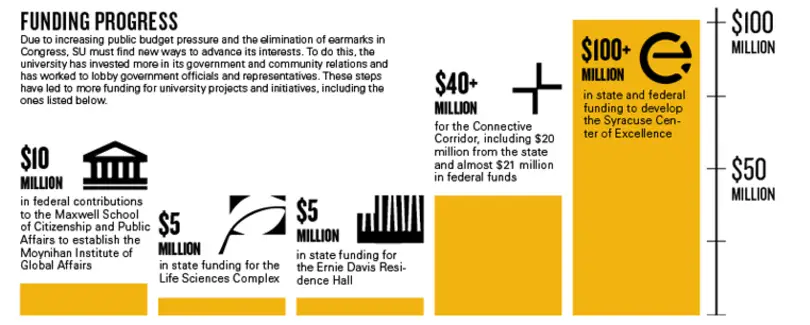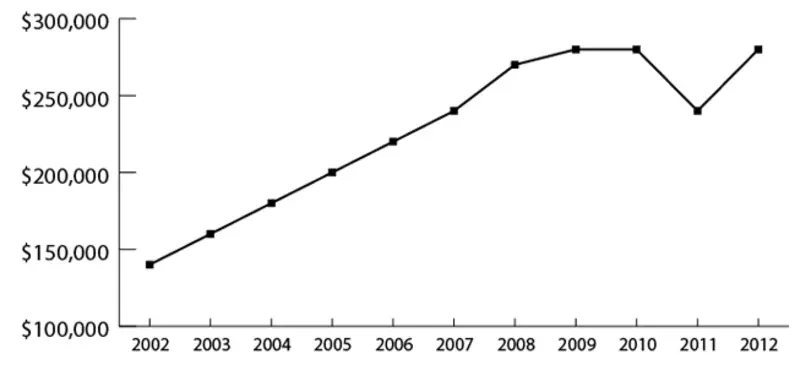SU increases lobbying to keep politicians aware of local issues
Government representatives don’t know everything. Often, decisions made in Washington, D.C., affect constituents in ways representatives don’t even realize.
That’s where lobbying comes in.
As budget cuts and funding crunches become the norm at national and state levels, SU has increased spending on lobbying to keep government representatives informed and aware of issues that matter to the university community.
SU spent $280,000 on lobbying in 2012, an increase of $140,000 since 2002, according to data from the Center for Responsive Politics released at the end of January.
The 2012 total is a $40,000 increase from 2011, when the university spent less than normal on lobbying due to leadership changes within SU’s Government and Community Relations office.
SU generally spends about $60,000-$80,000 per quarter on lobbying efforts, according to the Center for Responsive Politics.
In comparison to other schools and educational organizations, SU is ranked 71stout of the 686 schools that reported spending money on lobbying last year. The majority of schools and educational organizations that filed lobbying reports in 2012 spent $100,000 or less on lobbying, according to the Center for Responsive Politics.
The majority of the money SU spends on lobbying goes to internal sources, such as salaries for individuals in the Office of Government and Community Relations, said Eric Persons, associate vice president of government and community relations at SU in an email.
All of the $280,000 SU spent externally went to retaining two outside lobbying firms, French Alcott for federal relations and Whiteman Osterman & Hanna for state relations, he said.
Many actions are considered lobbying besides asking government representatives for funds or other favors, Persons said. The university frequently contacts congressional representatives to update them on issues in the SU community or to gather information on a university initiative. Both these actions are reported as lobbying activities, he said.
It’s very common for colleges and universities like SU to have lobbyists, and having this type of representation in Washington is very important, said Mike Fulton, a board member of the American League of Lobbyists. Lobbyists help schools keep track of both opportunities and potential pitfalls related to legislation and regulation, he said.
“The federal government is a big partner for universities and colleges in that it funds everything from veteran’s benefits to Pell grants to research,” he said. “Someone needs to be watching to make sure that Syracuse University is getting the most opportunity from the federal government that it can possibly get.”
Many colleges and universities also belong to trade associations, which can lobby representatives on national education issues of concern to many schools, Fulton said.
SU belongs to the National Association of Independent Colleges and Universities, amembership association that lobbies on issues affecting independent colleges, including student aid and tax and regulatory provisions, according to its website. Belonging to these types of organizations allows SU officials to focus on issues more specific to the university rather than larger national higher education issues, Persons said.
The university pays attention to a few key issues such as appropriations and legislation related to student aid and higher education. SU also lobbies to advance specific research areas and issues that develop through community partnerships,Persons said.
Many of SU’s lobbying efforts fall under the area of education. Twice in 2012, the university contacted New York senators and representatives about the activities and funding needs of Say Yes to Education, according to the Center for Responsive Politics.
SU also contacted representatives four times in 2012 about the university’s programs to increase college and high school graduation rates and three times about the university’s interests abroad, according to the Center for Responsive Politics.
In the area of appropriations, SU contacted Senators Chuck Schumer and Kirsten Gillibrand and urged them to vote to restore funding to the National Science Foundation’s political science program, according to the Center for Responsive Politics.
In May, the House of Representatives voted to eliminate funding for the program, according to a May 11, 2012 Inside Higher Ed article.
The university also works with the City of Syracuse and Onondaga County to alert representatives about issues and initiatives important to both partners such as the Connective Corridor, the Near Westside Initiative and the Save the Rain initiative, Persons said.
These partnerships with the city and county have resulted in more state and federal funding for community projects, he said.
The partnership’s lobby efforts helped the Syracuse Center for Excellence receive more than $100 million in state and federal funding, Persons said. More than $40 million in state and federal funding went toward the Connective Corridor initiative.
Specifically within SU, a $10 million contribution to the Maxwell School of Citizenship and Public Affairs allowed the school to establish the Moynihan Institute of Global Affairs. The Life Sciences Complex and the Ernie Davis Residence Hall have also each received $5 million in state funding, Persons said.
Funding for these types of projects is one example of the benefits of colleges and universities hiring lobbyists, said Fulton, the American League of Lobbyists board member. Schools that are not engaged in government relations can risk missing out on important relationships and funding opportunities from the U.S. government, he said.
“It’s like the lottery,” Fulton said. “If you don’t play the lottery, you can’t win the lottery.”
Published on February 27, 2013 at 11:17 pm
Contact Jessica: [email protected] | @JessicaIannetta






